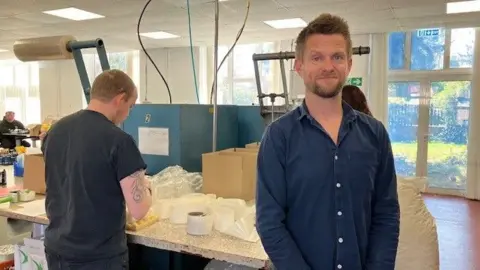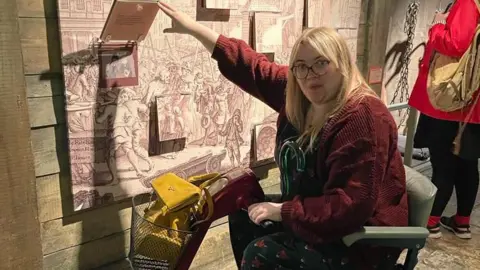Jobs fears as disability scheme owes businesses thousands
 Contributor handout
Contributor handoutBusinesses employing disabled people say they are owed hundreds of thousands of pounds by the government, and fear they may have to let staff go.
Under the Access to Work scheme, companies and employees can apply for grants to help support disabled people in the workplace.
But businesses have told the BBC there are backlogs and huge payment delays leaving them out of pocket.
One company told the BBC it is owed nearly £200,000 by the Access to Work scheme and is worried it may have to close.
Another said it had already been forced to shut down in part due to problems with the programme.
Access to Work was highlighted by ministers as a way of boosting the job prospects of disabled people when the government announced multi-billion pound welfare cuts last month.
The Department for Work and Pensions (DWP) said they had recently introduced a "streamlined claims process" to make swifter payments to businesses.
The programme can pay individuals with disabilities and the businesses that employ them for the extra costs associated with being in work. It covers a broad range of support, from paying for taxis to powered wheelchairs.

Yateley Industries is a near 90-year-old charity in Hampshire that employs almost 60 people, most of whom have disabilities, in a range of packaging jobs.
It says it is owed £186,000 by the Access to Work scheme.
"It's an existential threat to us," says chief executive, Sheldon McMullan. "If we don't get it, we could potentially close this magical place forever, and that would be a tragedy for the local community and for the government's agenda more broadly."
Yateley Industries is part of a nationwide forum of dozens of supported businesses - companies specialising in employing disabled people.
Mr McMullan says many others are affected by the backlog.
"The annoying thing is that it's money that's been granted to us," he adds. "We have the paperwork saying this is what each person's been awarded, but the claim system is not set up for us to draw down the money effectively."
Businesses say that as well as poor internal processes at the Department for Work and Pensions, there has also been a large increase in the bureaucracy associated with Access to Work in recent months, with many more forms having to be filled in and then posted – not uploaded or emailed – to the DWP.
"Until ministers realise that they've got this wrong, they're in danger of pushing so many disabled people out of the workplace," says Steven McGurk, president of the trade union, Community Union.
"Its very bureaucratic, very difficult to claim - it's the biggest threat to disabled people's employment."

In Newton Abbott in Devon, a cafe that employed people with learning disabilities shut last month. Its founders say new restrictions and problems with Access to Work contributed to the closure.
Sarah Thorp, who set up the No Limits cafe, said the scheme had in recent months started to refuse funding for people who wanted to get some work experience.
The decision came despite the local Job Centre recommending the individuals to the cafe. The change left the business with a shortfall of £800 a week.
"In the last 18 months, we've got 20 people into paid employment, all with disabilities," she says.
"When the issues around work experience changed in the last few months, we had to turn people down because we could not fund the support. It just seems really counter-intuitive when all the rhetoric is around getting disabled adults into work."
When the government unveiled cuts and restrictions to disability benefits last month, the Chancellor, Rachel Reeves, name-checked the Access to Work scheme as a programme that could help those who will lose out to get a job.
As well as businesses being able to claim, disabled people themselves can apply for help under the scheme.
They are also suffering delays and backlogs; in October, there were 55,000 outstanding applications, according to the DWP.
Some claimants are waiting more than six months to be assessed, with people writing on social media that the delays have resulted in them losing job offers.
The Department for Work and Pensions says it prioritises those who are newly offered a job.
 Contributor handout
Contributor handoutLucy Earle, 31, is a social media executive for a museum.
She has various disabilities and conditions, including agonising pain in her feet that means she needs to use a wheelchair.
It took six months for her claim to be looked at by Access to Work, and then she was assigned a wheelchair that wasn't suitable and left her upper body in pain.
"The last few weeks, I haven't been into work because I can't manage the pain of either using the wheelchair that isn't built for me, or being on my feet and not going very far."
She credits the Access to Work scheme with helping her stay in employment, but feels they are refusing reasonable requests.
"They're saying that the benefits are being cut so we can push more people into work, but then also Access to Work is having all these problems."
Steve Darling MP, the Lib Dem Work and Pensions spokesperson, says that while the principles behind Access to Work are excellent, "individuals and businesses are often covering significant sums from their own savings while waiting for payments from Access to Work, which risks pushing people into debt, or businesses even closing down. This is unacceptable."
Minister for Social Security and Disability, Sir Stephen Timms, said in February that Access to Work, established in 1994, "was not in a good shape at the moment."
Spending on the programme increased by 41% in 2023/24 to £257.8m.
"What we will need to do…is make some fairly significant reforms to Access to Work, look at whether employers can do more. There is quite a big issue here and the current style of Access to Work is unlikely to be sustainable in the long term," he said.
"We have to come up with something better and more effective, given the current very high level of demand."
In a statement, the Department for Work and Pensions said: "Last month we introduced a new streamlined claims process to ensure outstanding payments are made swiftly to businesses.
"We also continue to work with employers to explore how the Access to Work Plus claims process could be made easier for their employees and so people with high in-work support needs can thrive in employment."
